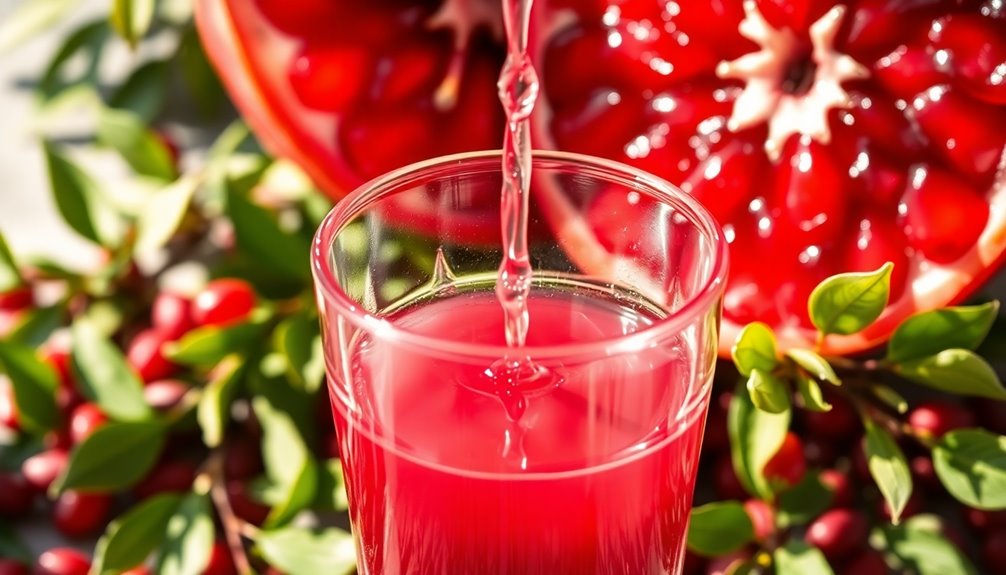To boost your fertility, aim for about 250 mL (1 cup) of pomegranate juice daily. This amount provides rich antioxidants that protect sperm from oxidative stress and improve blood flow to the uterus, creating a healthier environment for conception. Plus, the nutrients in pomegranate juice can enhance both male and female reproductive health. Want to know more about how pomegranate juice and other foods can support your fertility journey? Explore the details ahead!
Key Takeaways
- Aim for a daily intake of about 250 mL (1 cup) of 100% pomegranate juice for optimal fertility benefits.
- Pomegranate juice is rich in antioxidants that protect sperm and improve reproductive health.
- Regular consumption enhances blood flow to the uterus, aiding implantation and overall reproductive function.
- Consult a healthcare professional if on medications like blood thinners or if you have existing health conditions.
- Incorporate pomegranate juice into smoothies or salads to easily meet your daily intake.
Understanding the Role of Antioxidants in Fertility
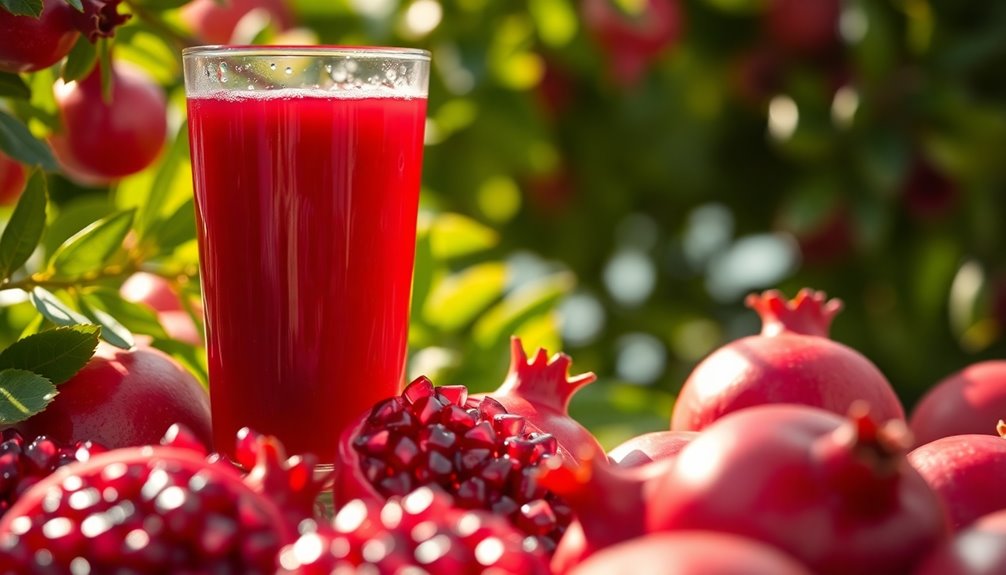
When it comes to enhancing fertility, understanding the role of antioxidants is essential. Antioxidants, especially the polyphenols found in pomegranate juice, play a critical role in protecting sperm from oxidative stress. This protection helps maintain sperm DNA integrity and improves overall sperm quality.
A diet rich in antioxidants can boost sperm motility, concentration, and morphology, all essential for male fertility. Additionally, these powerful compounds may stimulate the uterus, enhancing blood flow and uterine health, which can create a more favorable environment for pregnancy.
Regularly consuming antioxidant-rich foods, like pomegranate juice, can greatly increase your chances of successful pregnancy outcomes. Prioritizing a balanced diet with antioxidants is key to improving your reproductive health. Furthermore, incorporating essential oils into your wellness routine may also provide additional support for reproductive health.
Nutritional Profile of Pomegranate Juice
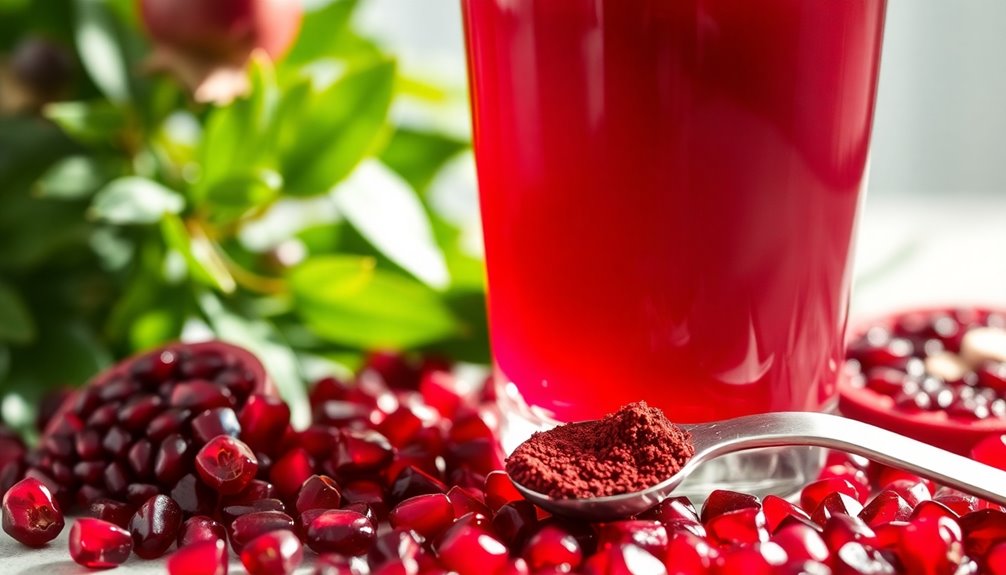
Pomegranate juice boasts a rich nutritional profile that makes it a valuable addition to your diet, especially for those looking to enhance fertility.
Here's what makes it stand out:
- High in antioxidants, particularly polyphenols
- Packed with essential nutrients like vitamin C, folate, and vitamin K
- Contains fiber, promoting digestive health
- Unique compounds like Punicalagins support immune function and overall well-being
- May stimulate the uterus, improving conditions for pregnancy
Incorporating pomegranate juice into your routine can help boost fertility by protecting sperm from oxidative stress and enhancing DNA integrity. Additionally, its antioxidant properties may contribute to overall reproductive health by combating free radicals.
Regular consumption, especially of 100% organic pomegranate juice, guarantees you reap these nutritional benefits, giving you an edge in your fertility journey.
Recommended Daily Intake of Pomegranate Juice
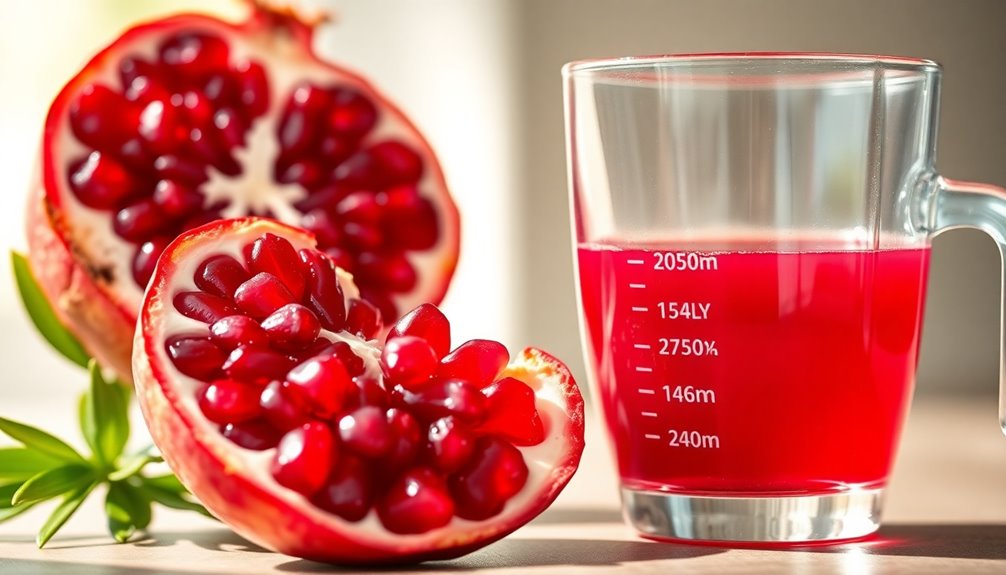
To reap the fertility benefits of pomegranate juice, aim for a daily intake of about 250 mL, or roughly one cup of 100% juice. This amount can help improve blood flow to the uterus and support a healthy uterine lining.
Rich in antioxidants, particularly polyphenols, pomegranate juice also protects sperm from oxidative stress and enhances sperm DNA integrity. If you're on medications like blood thinners or statins, it's wise to consult a physician before increasing your intake.
You can easily incorporate pomegranate juice into your diet through various recipes, including smoothies and salad dressings, while still meeting the recommended daily intake. Enjoy the taste and the potential fertility benefits!
Potential Benefits for Female Fertility
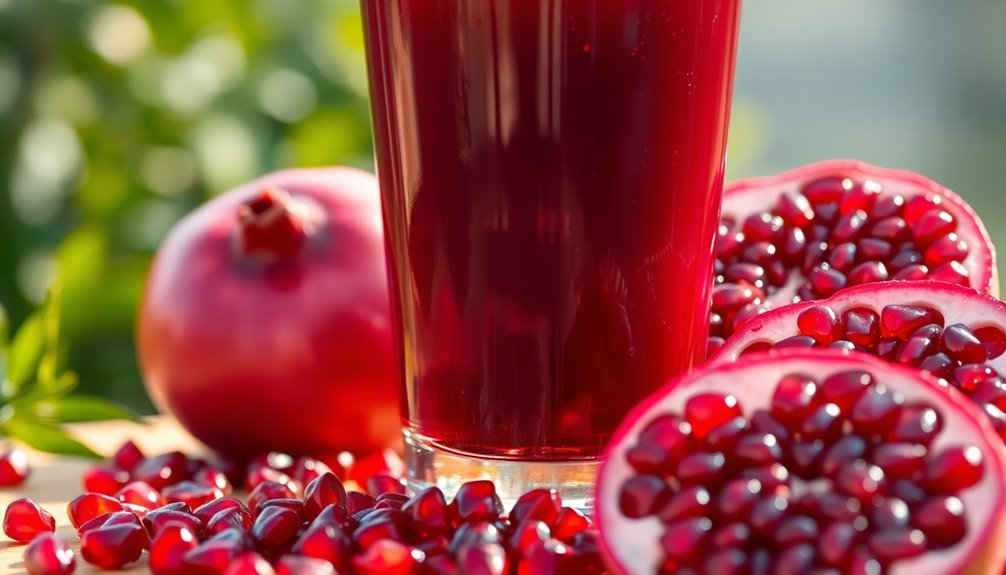
While exploring natural ways to enhance female fertility, you might find that pomegranate juice offers notable advantages. Regularly consuming about 250 mL (1 cup) daily can improve blood flow to the uterus, creating a more favorable environment for implantation.
Here are some benefits you might enjoy:
- Rich in antioxidants that protect reproductive health
- Supports balanced hormone levels essential for conception
- Contains vitamin C and folic acid to aid fertility
- May stimulate the uterus, improving conditions for pregnancy
- Historically symbolizes fertility and overall reproductive health
Additionally, pomegranate juice can complement a diet rich in antioxidants to further support reproductive health. Incorporating pomegranate juice into your diet could be a step toward boosting your fertility journey. Embrace these potential benefits and see the difference they can make!
Impact on Male Fertility and Sperm Quality
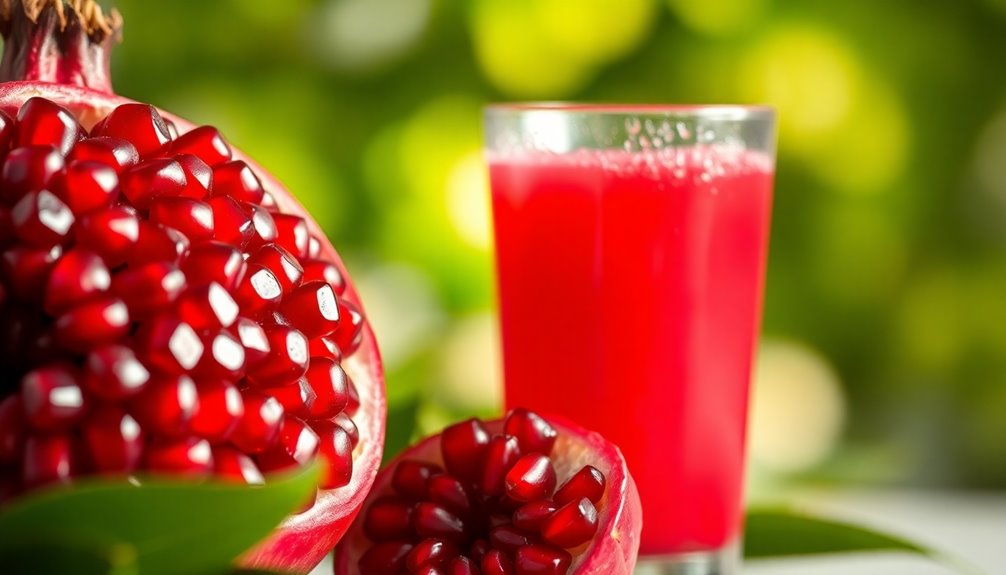
Enhancing fertility isn't just a concern for women; men also play an essential role in the process.
Pomegranate juice is a powerful ally for male fertility, packed with antioxidants and polyphenols that improve sperm quality. Regular consumption can enhance sperm motility, concentration, and morphology.
Studies in the Journal of Urology show it boosts sperm DNA integrity while protecting against oxidative stress. Plus, the nitric oxide levels in pomegranate juice may help tackle erectile dysfunction, enhancing overall sexual performance. Additionally, this juice can serve as a part of a comprehensive strategy for risk management strategies to support reproductive health during challenging times.
For ideal results, aim for about 250 mL (1 cup) of 100% pomegranate juice daily. Increased blood flow from this juice further supports reproductive health, making it an excellent addition to your fertility-boosting routine.
Incorporating Pomegranate Juice Into Your Diet
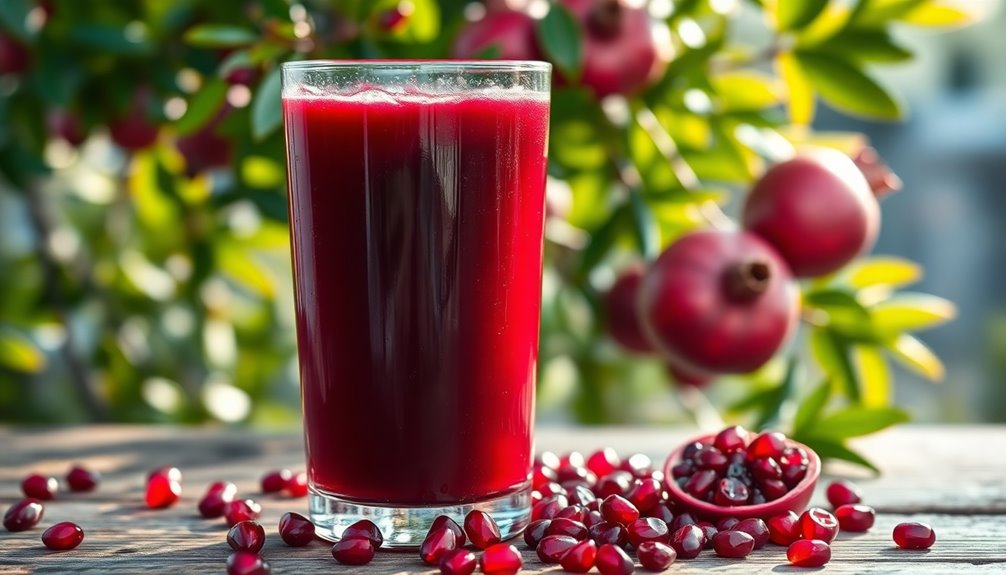
Incorporating pomegranate juice into your diet can be a delicious way to support your fertility goals. Aim for 250 mL (1 cup) of 100% organic pomegranate juice daily to enjoy its maximum benefits.
Here are some easy ways to include it:
- Sip it straight as a revitalizing drink.
- Blend it into smoothies for a nutrient boost.
- Use it in salad dressings for added flavor.
- Pair it with leafy greens and nuts for enhanced absorption.
- Enjoy it with breakfast, drizzled over yogurt or oatmeal.
Regular consumption of pomegranate juice can help increase blood flow to the uterus and promote a thicker uterine lining, creating a favorable environment for implantation.
Start enjoying these benefits today!
Precautions for Consuming Pomegranate Juice
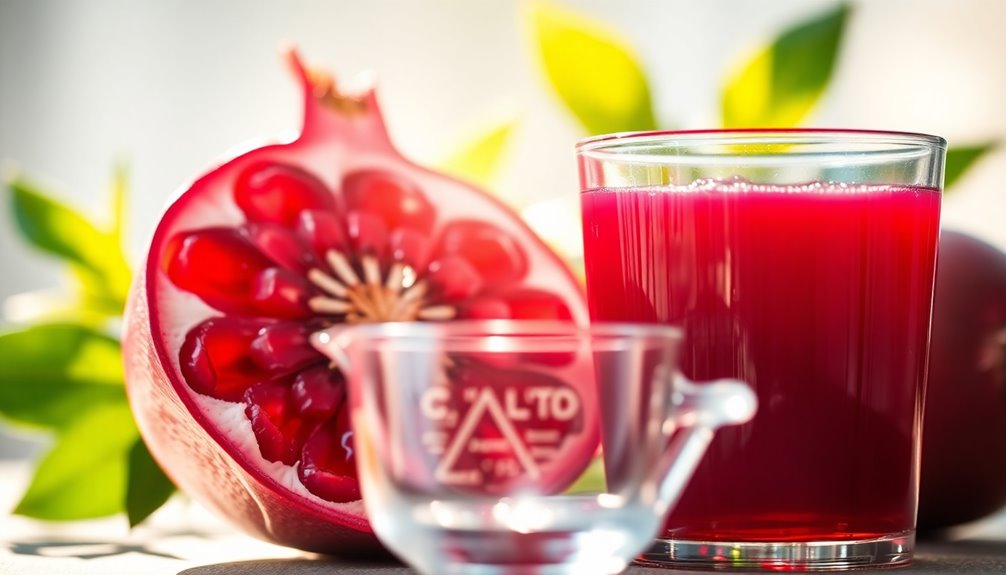
Before you start enjoying pomegranate juice, you should consider a few precautions.
If you're on blood thinners or statins, it's essential to check with your healthcare provider first.
Also, keep an eye on your intake to avoid any potential side effects or allergic reactions.
Medication Interactions
While pomegranate juice is celebrated for its health benefits, it's important to be aware of potential interactions with certain medications.
Here are some key points to keep in mind:
- Pomegranate juice may interact with statin drugs, impacting cholesterol metabolism.
- If you're on blood thinners, be cautious, as the juice can affect blood clotting.
- Consult your healthcare provider if you take medications for high blood pressure or cholesterol.
- The juice's antioxidant properties can complicate treatment regimens.
- Always inform your doctor about your intake of pomegranate juice and other dietary supplements.
Being proactive about these medication interactions will help you enjoy the benefits of pomegranate juice while safeguarding your health.
Recommended Dosage Guidelines
Understanding the proper dosage of pomegranate juice can enhance its fertility benefits while minimizing any potential risks.
The recommended dosage is 250 mL (1 cup) of 100% pomegranate juice daily. Incorporating this into a balanced diet allows you to enjoy its antioxidant properties and possible positive effects on sperm quality.
If you're on blood thinners or medications like statins, it's wise to consult with a healthcare professional before increasing your intake, as there may be interactions.
Also, avoid excessive consumption to prevent exceeding daily fruit serving recommendations.
You can enjoy pomegranate juice in various forms—juice, syrup, or added to recipes—just guarantee it's 100% organic to maximize health benefits.
Potential Allergies and Reactions
Although pomegranate juice offers numerous health benefits, it's important to be aware of potential allergies and reactions. Here are some precautions to take into account:
- Allergic reactions, though rare, can cause itching or swelling.
- If you have fruit allergies, especially to apples or Rosaceae family members, be cautious.
- Pomegranate juice may interact with medications like statins and blood thinners.
- Consuming more than 250 mL daily can lead to digestive issues.
- Those with kidney problems should consult a healthcare professional before consuming pomegranate juice.
Other Foods That Support Fertility
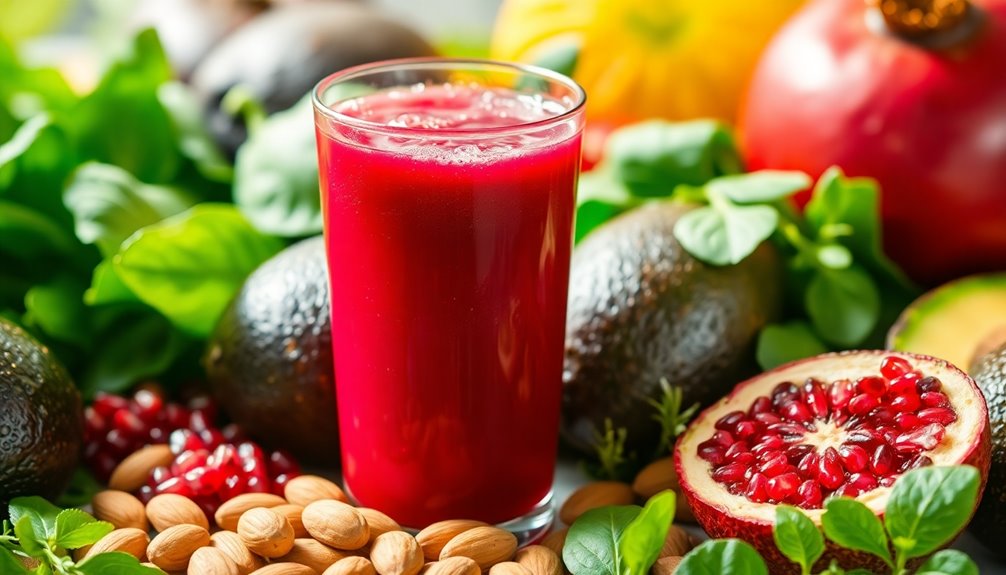
Incorporating a variety of foods into your diet can greatly enhance fertility. Along with pomegranate juice, several other foods are beneficial. Pineapple's core contains bromelain, which may improve blood flow to the uterus. Beetroot is rich in nitrates, boosting blood flow, while Brazil nuts provide selenium, protecting eggs from oxidative damage. Antioxidant-rich foods, like berries, also support sperm quality. Additionally, incorporating educational toys into your child's playtime can foster cognitive and emotional development, which may positively influence family dynamics.
| Food | Key Nutrient | Benefits |
|---|---|---|
| Pomegranate Juice | Antioxidants | Protects sperm from oxidative stress |
| Pineapple | Bromelain | May enhance uterine blood flow |
| Beetroot | Nitrates | Supports blood circulation |
| Brazil Nuts | Selenium | Protects eggs and embryos |
Adding these foods to your diet can work wonders for your fertility journey.
The Importance of a Balanced Diet for Reproductive Health
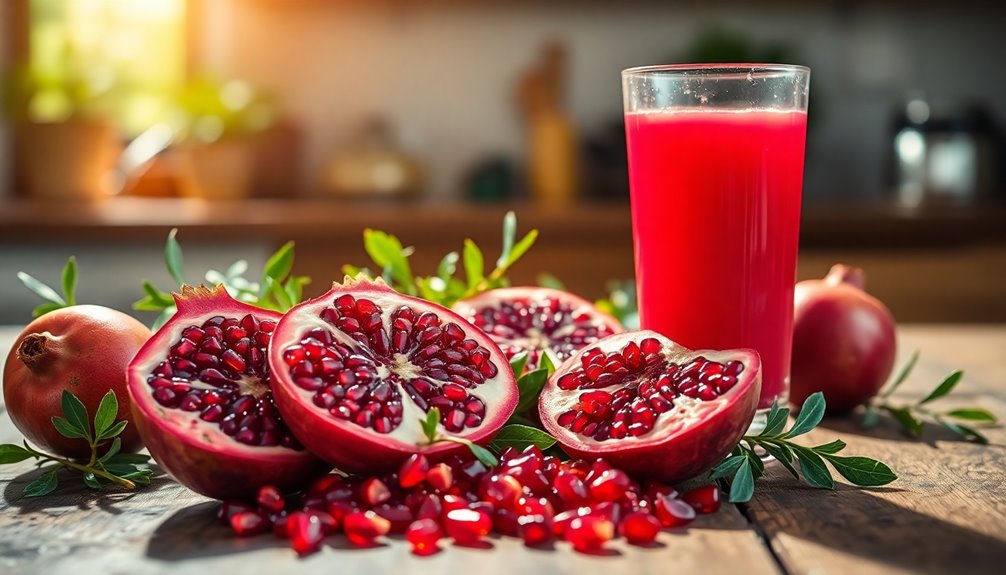
A balanced diet plays an essential role in supporting reproductive health and enhancing fertility. By focusing on nutrient-rich foods, you can greatly impact your fertility journey.
Here are some key benefits of maintaining a balanced diet:
- Boosts sperm quality and motility with antioxidants
- Supports hormonal balance with essential nutrients
- Regulates menstrual cycles for improved ovulation
- Fosters a healthier uterine lining for embryo implantation
- Aids in achieving and maintaining a healthy weight
Incorporating fruits, vegetables, whole grains, and lean proteins into your meals will help protect against oxidative stress while providing crucial nutrients like folic acid and vitamin C. Additionally, a focus on energy efficiency through dietary choices can also contribute to overall well-being and reproductive health.
Prioritizing a balanced diet can create a favorable environment for conception and overall reproductive health.
Consulting With Healthcare Professionals for Dietary Guidance

When it comes to enhancing your fertility, consulting with healthcare professionals is crucial for tailored dietary advice.
They can assess your individual health needs and monitor how your choices, like pomegranate juice intake, might interact with any medications you're taking.
Regular guidance guarantees you're making informed decisions that support your fertility goals.
Importance of Professional Advice
While many people look to pomegranate juice for its potential fertility benefits, consulting with healthcare professionals is essential to guarantee safe and effective use.
Here's why seeking professional advice is vital:
- Avoid interactions if you're on medications like blood thinners or statins.
- Get personalized recommendations on the right dosage—typically 250 mL (1 cup) of 100% juice daily.
- Ascertain dietary changes align with your overall health and fertility goals.
- Nutritionists can help create a tailored fertility diet that includes pomegranate juice.
- Regular consultations with fertility specialists can adjust your dietary plan based on your progress.
- Understanding filial responsibility laws can assist in planning for any potential financial implications related to your health and fertility journey.
Assessing Individual Health Needs
How can you guarantee that your dietary choices, like including pomegranate juice, are truly beneficial for your fertility? The key lies in evaluating individual health needs with the help of healthcare professionals.
Consulting with a provider guarantees that any existing medical conditions or medications are considered before increasing your pomegranate juice intake. While a daily consumption of 250 mL (1 cup) of 100% juice is recommended for potential fertility benefits, tailoring this advice based on professional guidance is vital.
Healthcare professionals can monitor your nutrient levels, guaranteeing that pomegranate juice complements your overall diet. Engaging with a nutritionist also offers insights on effectively incorporating this juice into a balanced fertility diet, enhancing your chances of success. Additionally, understanding the importance of hydration is crucial for overall health and fertility, which can be supported by proper dietary choices.
Frequently Asked Questions
How Much Pomegranate Juice Should I Drink for Fertility?
If you're looking to boost fertility, aim for about 250 mL, or one cup, of 100% organic pomegranate juice daily.
This amount provides essential nutrients and antioxidants that may enhance reproductive health.
It's believed to improve sperm quality in men and promote better blood flow to the uterus for women.
Just remember, if you're on blood thinners, you should be cautious about how much you're drinking to avoid potential interactions.
How Much Pomegranate Juice per Day to Get Benefits?
To get the benefits of pomegranate juice, you should drink about 250 mL, or one cup, each day.
This amount gives you a solid dose of antioxidants, particularly polyphenols, which can help protect sperm and improve overall reproductive health.
If you're a woman, the juice's nutrients, like folic acid, can support a healthy uterine environment.
Just remember to check with your healthcare provider if you're on any medications.
Which Juice Is Best for Improving Fertility?
Think of your body as a garden; the right nutrients can help it flourish.
When it comes to improving fertility, pomegranate juice stands out as a potent choice. Its antioxidants nurture sperm health and support hormonal balance, making it a top contender.
You might also consider juices like orange or blueberry, rich in vitamins and minerals.
However, always consult a healthcare provider before making changes, especially if you're on medication. Your health deserves attention!
How Much Pomegranate Juice per Day to Increase Testosterone?
To increase testosterone levels, you should aim for about 250 mL (1 cup) of 100% pomegranate juice daily.
This amount might help enhance your testosterone by improving blood flow and reducing oxidative stress. Pomegranate juice is packed with antioxidants, particularly polyphenols, which can positively influence hormone balance.
However, it's wise to consult your healthcare provider before making any significant changes, especially if you're on medications like blood thinners.
Conclusion
Incorporating pomegranate juice into your daily routine can be like planting seeds in your garden of fertility. Just as those seeds need the right conditions to bloom, your body thrives on antioxidants and nutrients to enhance reproductive health. Aim for a modest daily intake, and you might just see the blossoms of your efforts flourish. Remember, every little choice counts, so consider pomegranate juice a vibrant addition to your balanced diet for a healthier future. Moreover, pomegranate juice is not only delicious but also packed with essential vitamins that support overall wellness. By exploring the pomegranate juice nutritional benefits, you’ll discover its potential to improve circulation and reduce inflammation, both of which are crucial for reproductive health. So, as you sip on this vibrant elixir, envision the positive impacts it can have on your body and future.
Susannah expertise lies in researching and compiling evidence-based content on juicing, nutrition, and overall health. She is committed to ensuring that The Juicery World offers accurate, up-to-date, and trustworthy information to empower readers to take control of their health. Susannah’s goal is to inspire individuals to embrace juicing as a way to nourish their bodies and live their best lives.

